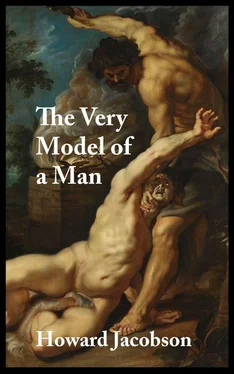They see into each other; she with pity threatening to be love, he with disinclination determined to be hate.
The one item of intriguing artifice about her person is the meticulously braided plait that hangs like a second spine down her back. This is the only part of Zilpah that Cain is able to envisage when Zilpah is not in front of him, and so comprehensively disgusts him that he can imagine forgiving all her other lesser failings for its sake. If ever he lays a hand on the assortment of pumping valves and easily splintered bones that is Naaman’s daughter — and he does not expect to — her fanatic plait will be the only reason.
The only reason other than her father, that is.
‘But we must leave you to your refreshment,’ Naaman remembers. ‘You must be dry. Can I have anything sent to you? A jug… a pitcher… a ewer… a gallipot… a jeroboam of wine?’
The grudging Cain allows a little light to flicker from his face. They are standing in a public place and members of his audience are still passing, still trying to secure him with their smiles. He has the use of a room in the bowels of the theatre and is suddenly impatient to be in it. He would like to lie down for a while. Rest his feet. Close his eyes. And try not to imagine all the ways in which he has inadvertently amused Naaman. To say nothing of inadvertently unamusing Naaman’s daughter.
‘Yes, wine,’ he says. ‘Yes. Thank you. A jeroboam should just do it.’
He watches Naaman and Zilpah depart, the father tall and loping, the more frightening for never being quite serious, the daughter barely held together by the twenty-four buttons that run down her spine, her plait rising and falling of its own will, capricious like the tail of a tree-monkey.
He does not, after all, repair immediately to the artist’s rest room, but takes a turn instead through the courtyard at the rear of the building, a fragrant, galleried garden built of stone, from which he can enjoy a view of the great white-tiered amphitheatre that climbs the marble mountain and loses itself in a smoking haze of dying sun and burnished cloud and olive trees.
Like everyone else in the talking business he sometimes imagines himself performing there, addressing a multitude so vast that those in the uppermost tiers, those sitting where the gods should have been, appear as nothing but iridescences of pigment in the marble. But the amphitheatre is reserved for mere games — bull-baiting, dog-fighting, horse-races — and for popular entertainments such as circuses and epic dramas set to sickly music, celebrating, as best as can be remembered, the engineering of Babel.
It is not in use tonight. It is too warm for sport. But like a sea-shell it retains its roar, although its only population now is bats and lizards.
The other outdoor venues — the market squares where the prophets and the pranksters gather, the parks and river banks that are popular with acrobats and near-sighted poetesses, the temple steps favoured by the little brown fairy-tellers from beyond the Indus — have not proved suitable to his purposes either. The competing voices jangle his nerves; the sight of a crowd half-listening to him and half-attending to a plate-spinner who can also imitate the roars of fabled monsters makes him lose his place in his story; and the atmosphere of rude commerce, one skill jostling for notice with another, men selling their experiences as though they were camel-bells or carpets, does not seem to him to be conducive to that deliberation of delivery, that covering up of tracks and thwarting of expectation, which is for him the sole justification for telling anything.
It was Naaman who found him an intimate indoor lecture theatre, assuring him that his natural audience, the city’s elite — teachers, civil servants, wives of men of action, the lame, the lost, the lonely — actually preferred to take their entertainment in the dark, off the ground, in small numbers, and far from sunlight.
‘Now if we had somewhere in one of our towers,’ Naaman had twinkled, ‘that would be absolutely perfect.’
Cain had watched him carefully. What did Naaman know about him and towers? Was he waiting for Cain to say, ‘Well, it’s strange that you should mention that because I mean in the end to erect a tower of my own’?
In fact the theatre was ideal. Cain, too, favoured elevation and the dark. And his audience was exactly as Naaman had predicted it… with the exception — that’s to say, with the inclusion — of Naaman’s own daughter.
Cain wishes he were as comfortable with the audience as with the theatre. He cannot describe his ideal congregation, but he knows what it isn’t. And what it isn’t is always what it is. ‘Why am I drawn to clerks and tutors and curators?’ he wonders. ‘And why are only those who squint and rub their foreheads drawn to me? I relate the blackest secrets of the heart; I discourse on disobedience, faithlessness, blasphemy and crime — yet when did a blasphemer or a criminal last come to hear me talk?’
He is not revolving these particular questions in his mind as he returns inside, although they are never distant from his thoughts. But a note which is waiting for him on the door of his rest room instantly revives them. The message is from the satiric poet, Preplen, whom Cain has encountered briefly on his promenades through the city, but has in the main chosen to ignore on the grounds that he, Preplen, appears to be after a connection, whereas he, Cain, is after whatever is the opposite.
A disconnection? No. That implies a prior tie, and prior ties are precisely what’s at issue between them.
The note is addressed, freely, to Cain the Edenite!?!? and says:
Fratricidal greetings!
(Or do I mean, fraternal?)
Peace, anyway.
I see that you are still working at getting the barbarians to like you. When will you be satisfied that they like you enough? Ignore that question… I dread the duration of your answer.
Tell me this, instead. What do you see when you look into a mirror. Yourself? You take my breath away. You’ll tell me next that a reflection cannot lie. Do you know what the average citizen of Babel sees when he looks into a mirror? He sees a saffron-skinned giant disappearing into silver cloud. Your father, against whom I will not hear a word, saw a magician. Your mother, against whom also I will not hear a word, saw the handmaiden of archangels. YHWH, against Whom I will not hear a vowel, has no reflection, but if He had It would be LAW.
Whatever takes your eye in the glass, Cain, you do not see the thing your barbarous Babel friends see. I have watched them looking at you. I know what form an Edenite assumes in their sight. Not pretty. Not pretty. And to think of your concern to dispel horn rumours, tail rumours, lest any offence to their refined aesthetic come between you and their liking — why, it would be tragic were it not ludicrous. Horns and a tail? Let me advise you, Cain, like a brother… all right, like a friend: horns and a tail would be an improvement, horns and a tail would be beauty itself, compared to what they think they behold when you walk among them.
It’s not my intention to upset you. Only to remind you what you are supposed to be here for. We do not flit in and out of other men’s houses, we Edenites, we do not settle on other men’s land and drink other men’s wine and water, merely in order that they should like us. We are meant to be demonstrating the transportability of our faith. Look: we do not convey statues, but we carry a voice.
Have you forgotten why you were sent from the presence of Your Creator? It wasn’t in order to be decorative, Cain. It wasn’t to show Shinarites that your skin was smoother than theirs. You were sent to be a goad. To prick with the tenacity of your remorse and His love. And to shame those who have never heard of either.
Читать дальше











